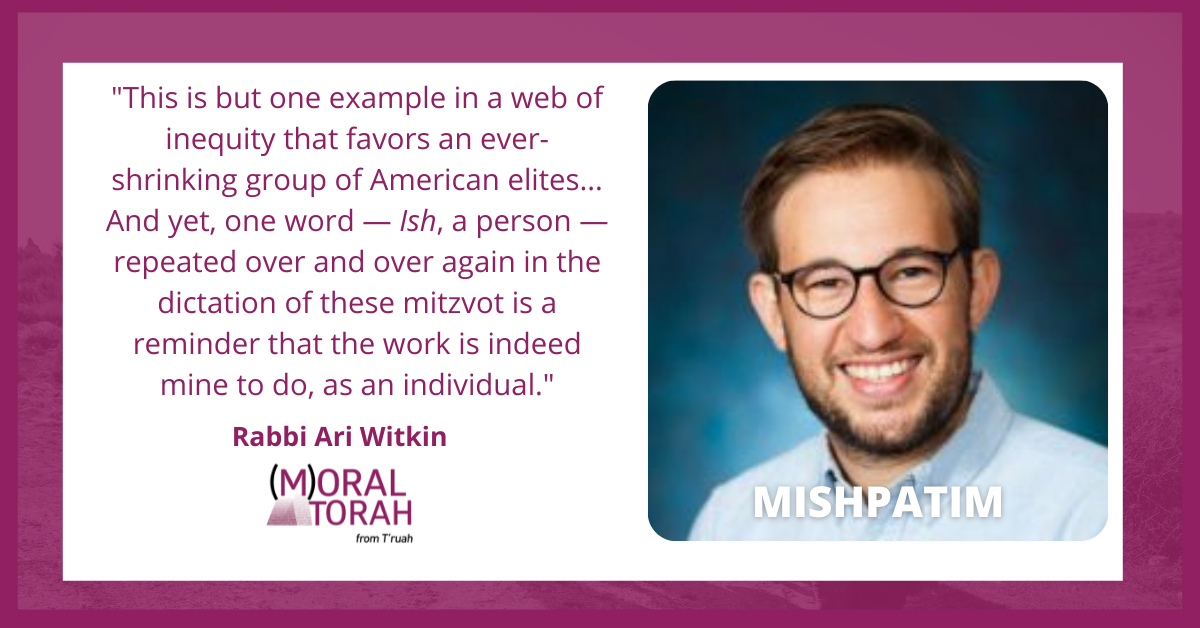A D’var Torah for Parshat Mishpatim by Rabbi Ari Witkin
Over the course of a long period that has felt more isolated than any I can remember, it’s easy to empathize with a desire to be a part of the crowd. After all, most of us have spent much of the past two years moving in and out of phases of quarantine and isolation.
At the same time, amidst this great period of social distancing, a new chapter of group think has arisen. Whether it manifests in a mob’s assault on our nation’s Capitol or the deafening echo chambers of social media, our society seems to have reached new depths in its embrace of polarizing proclamations of the “truth” about any and every issue regardless of the source of information.
Ironically, this trend is steeped in the very American ideal of rugged individualism. I say ironically because it seems that, in our embrace of individual rights and freedoms, too many Americans have slipped into a sheep-like pattern of following the loudest voices. As best-selling author and Harvard University lecturer Tom Nichols put it in his book The Death of Expertise, “to reject the advice of experts is to assert autonomy… It is a new Declaration of Independence: No longer do we hold these truths to be self-evident, we hold all truths to be self-evident, even the ones that aren’t true.”
Sign up to receive (M)oral Torah in your inbox each week.
This type of populist phenomenon is nothing new. In warning against such a trend, this week’s parshah proclaims, “You shall not side with the mighty/multitude to do wrong – you shall not give perverse testimony in a dispute so as to pervert it in favor of the mighty…” (Exodus 23:2) Reading Parshat Mishpatim, which outlines 53 different mitzvot focused on the laws of a fair and just society, I can’t help but imagine the disappointment God must feel about the institutions of our society and how far they are from those the Torah describes.
Our political and judicial systems are not simply overrun with perversions that favor the mighty, they are constructed upon the very assumption that the mighty be favored. These assumptions are the underpinnings that manifest systemic oppression.
Among the many aspects of jurisprudence outlined in the mitzvot of Mishpatim are those related to punishment, or sentencing. Though the Torah often prescribes capital punishments that neither I, nor the ancient rabbis for that matter, support, its rulings are consistent regardless of the identity of the perpetrator.
In our own court system, however, judges and juries routinely convict and sentence BIPOC individuals at distinctly higher rates and with significantly higher penalties than white defendants. This “perversion in favor of the mighty” is not simply enacted through unconscious bias but quite literally written into law. For example, the Anti-Drug Abuse Act, introduced under President Ronald Reagan, created mandatory minimum sentences with a 100:1 disparity between crack cocaine, more commonly used in communities of color, and powder cocaine, more often found amongst white drug users. Even when attempting to rectify this in 2010, Congress still retained a disparity of nearly 20:1.
Find more commentaries on Mishpatim.
This is but one example in a web of inequity that favors an ever-shrinking group of American elites. As an individual, it can feel overwhelming, even paralyzing, to think about how I can make a difference in shifting these structures. And yet, one word — Ish, a man (but let’s be egalitarian and say, generally, a person) — repeated over and over again in the dictation of these mitzvot is a reminder that the work is indeed mine to do as an individual.
 The first step in this process is almost always listening for the voices beyond the echo chamber, coming back to those truths which are in fact self-evident, not simply proclaimed as such. Amidst the cacophony our Torah serves as a guide post, reminding us that eleh hamishpatim, these are the rules, the building blocks of a just society, and it is our job to enact and defend them.
The first step in this process is almost always listening for the voices beyond the echo chamber, coming back to those truths which are in fact self-evident, not simply proclaimed as such. Amidst the cacophony our Torah serves as a guide post, reminding us that eleh hamishpatim, these are the rules, the building blocks of a just society, and it is our job to enact and defend them.
Rabbi Ari Witkin is the Director of Leadership Development at the Jewish Federation of Metropolitan Detroit. He holds an MS in Nonprofit Leadership from the University of Pennsylvania and Rabbinic Ordination from the Reconstructionist Rabbinical College, where he was a Wexner Graduate Fellow. In 2016-17, he was a T’ruah Israel Fellow. Ari lives in Huntington Woods, MI, with his wife Liz Traison and their kids Hadar and Raviv.

